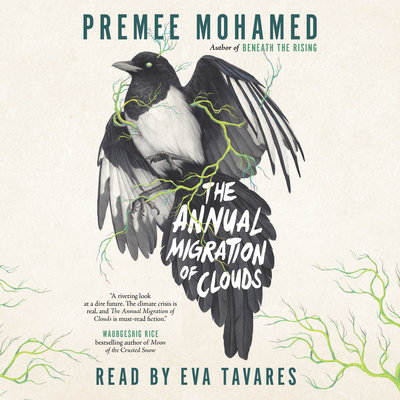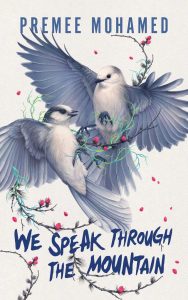 The Annual Migration of Clouds by Premee Mohamed
The Annual Migration of Clouds by Premee Mohamed Narrator: Eva Tavares
Format: audiobook, ebook
Source: purchased from Amazon, purchased from Audible
Formats available: paperback, ebook, audiobook
Genres: dystopian, post apocalyptic, science fiction
Pages: 158
Length: 4 hours and 49 minutes
Published by ECW Press on September 28, 2021
Purchasing Info: Author's Website, Publisher's Website, Amazon, Barnes & Noble, Kobo, Bookshop.org, Better World Books
Goodreads
In post-climate disaster Alberta, a woman infected with a mysterious parasite must choose whether to pursue a rare opportunity far from home or stay and help rebuild her community.
The world is nothing like it once was: climate disasters have wracked the continent, causing food shortages, ending industry, and leaving little behind. Then came Cad, mysterious mind-altering fungi that invade the bodies of the now scattered citizenry. Reid, a young woman who carries this parasite, has been given a chance to get away - to move to one of the last remnants of pre-disaster society - but she can't bring herself to abandon her mother and the community that relies on her.
When she's offered a coveted place on a dangerous and profitable mission, she jumps at the opportunity to set her family up for life, but how can Reid ask people to put their trust in her when she can't even trust her own mind?
My Review:
There’s a deep, dark chasm between “the end of the world as they know it” and “the end of the world”. It’s a badly carved gorge where the steps going down are slippery, steep and riddled with stretches that have been completely washed out and strewn with sharp rocks and trail-obstructing boulders. The steps going up the other side are much too far away to see – and might not even exist at all.
In movies – one of the many, many things from the “Before Times” that no longer exist in Reid’s broken world – and books – of which there are some but not nearly enough – the end of the world is a catastrophic EVENT, a thing that happens or more likely that the brave heroes of the fictional narrative manage to stave off by luck, by ingenuity, by miracle, or all of the above.
But that’s not what happened in the world that Reid lives in. There was no singular event, no one, overwhelming catastrophe, no nuclear or meteor strike. Just a long, slow slide down the side of that chasm, as birth rates fell and climate change got more extreme and power sources dried up or died out or became too remote to access as the world fell back into its constituent parts.
Reid lives in a world of scarcity, in a ‘city’ that barely hangs on from year to year and from disaster to disaster, as a parasitic ‘disease’ ravages her body and her mind and increases its hold on the dwindling population year by year.
But there’s a light at the end of Reid’s dark tunnel – a light that’s just for her. A few places, former enclaves of the rich from back in the day when money still mattered – closed the gates of their domes, their pockets of science and tech and ‘civilization’ from the ‘Before Times” and kept the barbarians and the diseases and the wildlife OUT of their pristine sanctuaries.
One of those enclaves is Howse University. Every year, Howse sends out invitations to a privileged few graduating students in the remote cities to come to Howse and enter the next class. To enter a world where electricity still functions, where books are still printed and not merely preserved, where science still happens and knowledge is passed from teacher to students in the lap of safe, well-fed, climate controlled luxury.
A place where Reid might be able to find a cure for the disease that is taking over both her mother’s body and mind – and her own.
All Reid has to do is reach the assigned meeting place in the limited time available. All she has to do is get her mother to forgive her for leaving, for possibly turning her back on everything and everyone Reid has known and loved, on the people and the place and the community that has sheltered her for her entire life.
Traveling all alone through an unknown wilderness is going to be much, much easier than getting her mother – and the parasite that lives within her – to accept that their daughter is leaving them behind.
 Escape Rating A-: I picked up this book because I read the sequel to this, We Speak Through the Mountain first and it felt like half a story. A very good half, but still a half and reading the second half without the first I felt like I was missing something. Which, as it turned out, I was. Not enough to prevent me from liking the other book, but enough to keep me from getting as invested in Reid’s journey as I did this time around – although I do feel that investment in the second book now in retrospect.
Escape Rating A-: I picked up this book because I read the sequel to this, We Speak Through the Mountain first and it felt like half a story. A very good half, but still a half and reading the second half without the first I felt like I was missing something. Which, as it turned out, I was. Not enough to prevent me from liking the other book, but enough to keep me from getting as invested in Reid’s journey as I did this time around – although I do feel that investment in the second book now in retrospect.
In other words, don’t do what I did. If the premise of this book or We Speak Through the Mountain speaks to you, read The Annual Migration of Clouds first. They’re both novellas, so even together they are not a big read, but they are a deep one, and deeper when read together in the proper order.
I listened to most of this book, but had to finish in the ebook because as the story got closer and closer to its ending I felt compelled to discover how Reid managed to get to where we first met her in We Speak Through the Mountain – particular the disaster that her brain kept shying away from during that story.
However, the narrator for The Annual Migration of Clouds was excellent and did a terrific job of portraying Reid’s oh-so-real combination of angst and anger as she works her way through her present situation, the history she’s forced to inherit, the unfairness of the world to which she was born, her love for her mother and her community and her NEED to discover as much as she can of what’s been denied her. Even as her internal voice rants and rails at the parasite that influences her thoughts and controls her behavior to a degree that she only becomes conscious of when she fights it. Because it punishes her when she does.
The Annual Migration of Clouds is a coming-of-age story AND it’s a story about the survivors of the end of the world, making their way down that slippery slope of retreating technology and regressive knowledge, just trying to get through another day and another year in the hopes that someday it will all be better for someone – even though they all know that better day will not come for them.
If this part of the story, this description and setup of a world in decline in a way that is in no way the fault of anyone or anything mired in it grabs your imagination, if the way that Reid’s community has managed to survive, along with the many ways in which they demonstrate, as best they can, that survival is insufficient, reads as fascinating and entirely too plausible – as it did to this reader – there are other stories that take this same concept and follow it in different directions – or are nearer to or farther down the road from that initial slide – such as Lark Ascending by Silas House, The Starless Crown by James Rollins, and Station Eleven by Emily St. John Mandel may also appeal – and vice versa as well.
Reid’s experiences at Howse University, as related in We Speak Through the Mountain, ask a different set of questions, questions about what the haves owe to the have nots, and what happens when an outsider, repeatedly and often, challenges the smug elitism of their safe, secure, patronizing privilege. Now that I know how Reid came to those experiences, I may go back and experience them again for myself to see how much that story has changed now that I have more of this one.
















One thought on “A- #AudioBookReview: The Annual Migration of Clouds by Premee Mohamed”
Comments are closed.